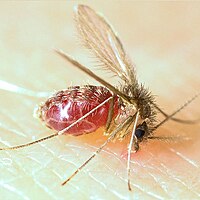
Photo from wikipedia
Metacyclic Leishmania promastigotes are transmitted by sand flies that inject parasites and saliva into the host's skin. Previous studies have demonstrated that DNA plasmids encoding Lutzomyia longipalpis salivary proteins LJM17… Click to show full abstract
Metacyclic Leishmania promastigotes are transmitted by sand flies that inject parasites and saliva into the host's skin. Previous studies have demonstrated that DNA plasmids encoding Lutzomyia longipalpis salivary proteins LJM17 and LJL143, when used to immunize dogs, resulted in a systemic and local Th1 cell-mediated immunity that interfered in parasite survival in vitro. Here we evaluated the ability of these same salivary antigens to induce anti-Leishmania immunity and to confer protection by immunizing dogs using a novel vaccination strategy more suitable for use in the field. The strategy consisted of a single dose of plasmid followed by two doses of recombinant Canarypoxvirus (rCanarypoxvirus) expressing L. longipalpis salivary proteins (LJM17 or LJL143). Thirty days after the final immunization, dogs were intradermally challenged with 107 Leishmania infantum promastigotes in the presence of L. longipalpis saliva. We followed the experimentally infected dogs for 10 months to characterize clinical, parasitological, and immunological parameters. Upon vaccination, all immunized dogs presented strong and specific humoral responses with increased serum concentrations of IFN-γ, TNF, IL-7, and IL-15. The serum of dogs immunized with LJM17 also exhibited high levels of IL-2, IL-6, and IL-18. L. infantum infection was established in all experimental groups as evidenced by the presence of anti-Leishmania IgG, and by parasite detection in the spleen and skin. Dogs immunized with LJM17-based vaccines presented higher circulating levels of IFN-γ, IL-2, IL-6, IL-7, IL-15, IL-18, TNF, CXCL10, and GM-CSF post-infection when compared with controls. Results demonstrated that relevant Leishmania-specific immune responses were induced following vaccination of dogs with L. longipalpis salivary antigen LJM17 administered in a single priming dose of plasmid DNA, followed by two booster doses of recombinant Canarypox vector. Importantly, a significant increase in pro-inflammatory cytokines and chemokines known to be relevant for protection against leishmaniasis was evidenced after challenging LJM17-vaccinated dogs as compared to controls. Although similar results were observed following immunization with LJL143, the pro-inflammatory response observed after immunization was attenuated following infection. Collectively, these data suggest that the LJM17-based vaccine induced an immune profile consistent with the expected protective immunity against canine leishmaniosis. These results clearly support the need for further evaluation of the LJM17 antigen, using a heterologous prime-boost vaccination strategy against canine visceral leishmaniosis (CVL).
Journal Title: Frontiers in Immunology
Year Published: 2018
Link to full text (if available)
Share on Social Media: Sign Up to like & get
recommendations!